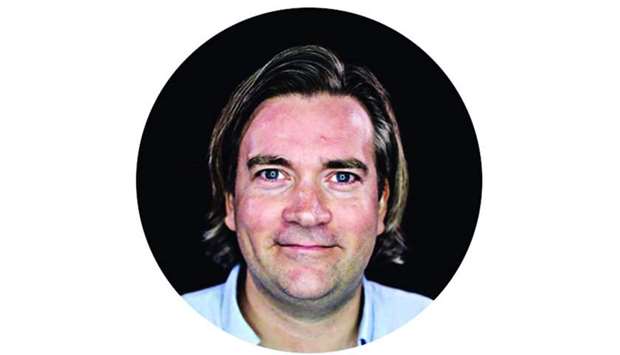London-based fintech Vesuvio Labs is in the process of setting up an investment vehicle in Qatar as part of its expansion and help Doha's entities, especially startups, enter the wider Middle East, Levant and other global markets.
The vertically integrated venture builder for the insurance and finance sector – which is setting up the base in the Qatar Financial Center (QFC), making its foray into the GCC (Gulf Cooperation Council) – is expected to work with 5 to 10 local companies in the first year and is also hopeful that one or two of its portfolio companies in London will choose to relocate to Doha.
"We support entrepreneurs with technology execution and we often either co-found or take an equity stake in exchange for technology services. So we have a fast growing portfolio of companies and in that sense we look a bit like a venture capital," its founder and director Kristian Feldborg told Gulf Times in an exclusive interview.
Highlighting that efforts are on to create the investment or special purpose vehicle; he said "our lawyers and accountants are sorting out the paperwork as we speak and one of advisors from Qatar, a prominent investor, will chair the investment committee.”
Acknowledging that the QFC licence is its first venture in the GCC; he said it is also open to opportunities in the Middle East.
Stressing that it doesn't see Qatar as just a stepping stone; Feldborg said "we want to develop a real business in Doha and we want it to become a key constituent in the global fintech innovation ecosystem."
The company‘s interest in Qatar is due to the country's several ambitious transformation projects, according to him.
Highlighting that plenty of aspiring companies in Qatar are aggressively expanding into new markets and all need technology; he said “we also very much want to be part of building a start-up ecosystem in Qatar, incubating business locally that can be exported to the region and globally.”
Specifically interested in the new port project, he said, opportunities are aplenty especially in cargo and frictionless trade and therefore for the cargo and shipping disruptors.
"We have found that our way on thinking about ecosystems is very much in line with Qatar’s approach, and I think we will see some really interesting public, private partnerships that can take things even further by developing progressive platforms that can give companies a head start, if they choose to incubate their ideas in Qatar. All the ingredients are there and, if we work together, we can all be very successful," he said.
Vesuvio Labs, which helps entrepreneurs by accelerating the process of turning their ideas into scalable products, has an important role to play in Qatar's transformation projects, according to Feldborg.
"We have pipeline of projects in retail banking, business banking, E-commerce, small and medium enterprises services and proptech not only in Qatar but also in Turkey, Jordan, Oman and Kuwait," he said, highlighting that these projects were introduced to it through its partners in Qatar who have business interests and relationships in many other countries.
"We support entrepreneurs with technology execution and we often either co-found or take an equity stake in exchange for technology services. So we have a fast growing portfolio of companies and in that sense we look a bit like a venture capital," its founder and director Kristian Feldborg told Gulf Times in an exclusive interview.
Highlighting that efforts are on to create the investment or special purpose vehicle; he said "our lawyers and accountants are sorting out the paperwork as we speak and one of advisors from Qatar, a prominent investor, will chair the investment committee.”
Acknowledging that the QFC licence is its first venture in the GCC; he said it is also open to opportunities in the Middle East.
Stressing that it doesn't see Qatar as just a stepping stone; Feldborg said "we want to develop a real business in Doha and we want it to become a key constituent in the global fintech innovation ecosystem."
The company‘s interest in Qatar is due to the country's several ambitious transformation projects, according to him.
Highlighting that plenty of aspiring companies in Qatar are aggressively expanding into new markets and all need technology; he said “we also very much want to be part of building a start-up ecosystem in Qatar, incubating business locally that can be exported to the region and globally.”
Specifically interested in the new port project, he said, opportunities are aplenty especially in cargo and frictionless trade and therefore for the cargo and shipping disruptors.
"We have found that our way on thinking about ecosystems is very much in line with Qatar’s approach, and I think we will see some really interesting public, private partnerships that can take things even further by developing progressive platforms that can give companies a head start, if they choose to incubate their ideas in Qatar. All the ingredients are there and, if we work together, we can all be very successful," he said.
Vesuvio Labs, which helps entrepreneurs by accelerating the process of turning their ideas into scalable products, has an important role to play in Qatar's transformation projects, according to Feldborg.
"We have pipeline of projects in retail banking, business banking, E-commerce, small and medium enterprises services and proptech not only in Qatar but also in Turkey, Jordan, Oman and Kuwait," he said, highlighting that these projects were introduced to it through its partners in Qatar who have business interests and relationships in many other countries.


